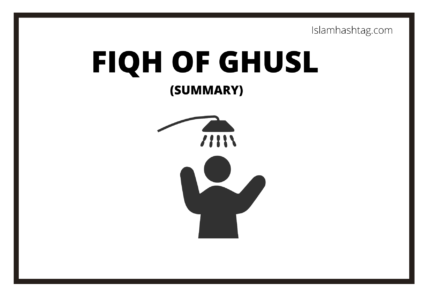Fiqh of Ghusl/ritual purification -Faraidh of ghusl and more
Ghusl meaning?
Ghusl means ritual purification. It means the bath makes you pure to perform salah, read Quran and fulfill your religious obligation as a Muslim.
Learning the fiqh of ghusl is important. We need to know when is ghusl Fardh on us and when is it wajib. When we were studying the fiqh of ghusl with our teacher, he accepted that this is the least talked about topic in the lectures and khutba and many women do not know when it is fardh for them to do ghusl and as a result they end up remaining in Janabat and missing their salah.
There are many mis-notions among the women about the ghusl after periods. It is surprising to note that some community do not regard the ghusl to be complete if the women do not rub their body with mud. But in reality, if one needs to come out of the najasat all he/ she needs to do is to make sure they have washed the parts that are fardh and do the ghusl in the sunnah way.
Below is the summary of the Fiqh of ghusl which is taken from the book Ascent to felicity, an English translation of the book “Maraqi al sa’adat by Abu al Ikhlas al shurunbulali who is also the author of Nurul iddah” This is according to Hanafi law of Islamic Jurispudence.
Also read- Dua before studying
How to do ghusl?

Faraidh of ghusl
The following three actions are obligatory integrals of the ghusl:The Faraidh of ghusl without which the ghusl will not be proper.
- Rinsing the [entire] mouth [once],
- Rinsing the nose [i.e., up to the bone, once],
- Washing whatever is possible, without undue difficulty or hard-ship, of the entire body [once].
Sunnah of Ghusl
Among the emphasized sunnas of the ghusl are the following, in this order:
- Intention (niyah),
- Washing the hands until the wrists,
- Washing one’s private parts [front and rear],
- Washing off any filth from the body,
- Performing wudu first, followed by pouring water over the entire body, starting with the head [for a total of three times ].
When do we need to do Ghusl?
The ghusl is of three types:
It is Fardh to do ghusl if
Obligatory It is fardh to do ghusl ), namely, when any one of the following things occur:
( 1) The emission of sperm/sexual fluid (mani) that leaves its normal place inside the body with pleasure [even if it exits without pleasure], for any reason, such as a wet dream or by
looking [at someone or something with lust];
( i.) The disappearance of the head of the penis into the vagina of a human being whose body is desirable [even if without emission of sexual fluid];
( 3) The ending of menstruation or postnatal bleeding;
It is Wajib to do ghusl if
Mandatory (wajib), namely, for someone who becomes Muslim while in a state of major ritual impurity, although the sounder opinion is that the bath is obligatory on him, not mandatory (wajib);
It is Nafil or Recommended to do ghusl if
- Recommended (nafil), for any one of the following reasons:
(I) The Friday prayer (jumu’a),
(2) The two ‘id prayers,
(3) Entering into the state of pilgrim sanctity (ihram),
(4) The Day of ‘Arafa,
( 5) Entering Makka,
( 6) Entering Madina, the illuminated City,
( 7) Visiting the Prophet Sallalhu alaihe wa sallam
What to do if there is no water for ghusl?
Question: If a person needs to do ghusl and there is water available but no adequate facilities to do ghusl, and they have no chance of reaching an area where they can do ghusl before salah time finishes, what should they do?
In principle, if a one is in need of a Ghusl and water is available, then it will be necessary for one to make Ghusl. However, if a person needs to make Ghusl for example, while travelling on a plane and a women completes her menses and there is no adequate facility to make Ghusl, then one should explore all avenues to search for an adequate place to make Ghusl and perform Salaah. If one fears that Salah will become Qadha and has exhausted all possibilities to make Ghusl then they will make Tayyamum and perform Salaah. Tayyamum will suffice as a substitute for Ghusl.
الدر المختار وحاشية ابن عابدين (رد المحتار)
. وفي القهستاني: إذا كان للجنب ماء يكفي لبعض أعضائه أو للوضوء تيمم ولم يجب عليه صرفه إليه، إلا إذا تيمم للجنابة ثم أحدث فإنه يجب عليه الوضوء لأنه قدر على ماء كاف، ولا يجب لأنه بالتيمم خرج عن الجنابة إلى أن يجد ماء كافيا للغسل، كذا في شرح الطحاوي وغيره
(وأما) الغسل المفروض فثلاثة: الغسل من الجنابة، والحيض، والنفاس أما الجنابة فلقوله تعالى {وإن كنتم جنبا فاطهروا} [المائدة: 6] ، أي: اغتسلوا وقوله تعالى {يا أيها الذين آمنوا لا تقربوا الصلاة وأنتم سكارى حتى تعلموا ما تقولون ولا جنبا إلا عابري سبيل حتى تغتسلوا} [النساء: 43]
قال (وإذا تيمم المسافر والماء منه قريب وهو لا يعلم به أجزأه تيممه به) لأنه عاجز عن استعمال الماء حين عدم آلة الوصول إليه وهو العلم به فهو كما لو كان على رأس البئر وليس معه آلة الاستقاء فله أن يتيمم. ولم يفسر حد القرب في ظاهر الرواية في حالة العلم به والمروي عن محمد – رحمه الله تعالى – قال إذا كان بينه وبين الماء دون ميل لا يجزئه التيمم وإن كان ميلا أو أكثر أجزأه التيمم
Discover more from Islam Hashtag
Subscribe to get the latest posts sent to your email.




